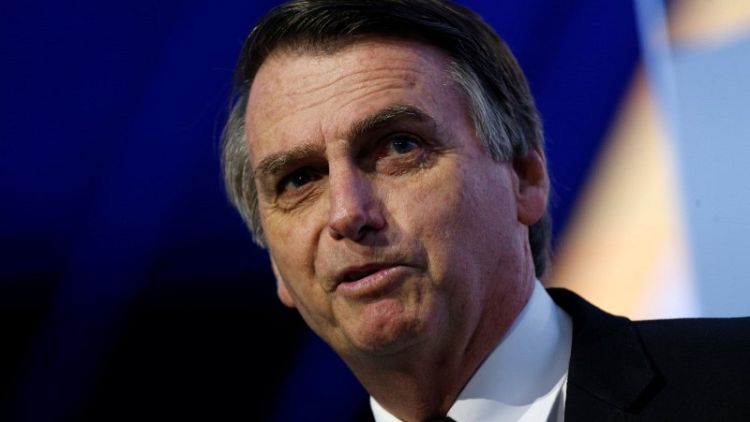By Anthony Boadle
BRASILIA (Reuters) - For years, Brazil's presidential frontrunner, the right-wing lawmaker Jair Bolsonaro, has made headlines for the wrong reasons.
He grabbed national attention in 2014 when he told a congresswoman on the floor of the lower house: "I won't rape you because you do not deserve it."
Since then, offensive comments against homosexuals, blacks and indigenous people have generated controversy and attracted a fierce social media following fed up with what they call "political correctness" from his critics.
Yet the shock tactics that once thrust him onto the front pages of newspapers may be yielding diminishing returns.
Despite his strength in the polls, the former Army captain's exposure in major media outlets has trailed key rivals this year, including one with a fraction of his support, according to researchers at the State University of Rio de Janeiro (UERJ).
That and his lack of major party alliances, campaign funds or television advertising time under Brazil's electoral rules could make it hard for the congressman to maintain his lead as the presidential campaign formally kicks off in two weeks.
Bolsonaro wears the ostracism with pride, likening his struggle with mainstream media to that of U.S. President Donald Trump, whose 2016 campaign he cites as a model for his run.
"Trump also suffered with all this fake news," he said in a television interview on Monday. "What Trump suffered in his campaign, I've been suffering for years in the Brazilian media."
For all of Trump's antagonism with the media, however, the wealthy former reality TV star dominated coverage of the U.S. presidential race. From January to September 2016, he got more than twice as much time on the nightly newscasts of ABC, CBS and NBC as his Democratic rival Hillary Clinton, according to the Tyndall Report, which has tracked the broadcasts for 40 years.
By contrast, mentions of Bolsonaro on Brazil's most-watched newscast and the front and main editorial pages of the country's top three newspapers from January to late July trailed former Sao Paulo Governor Geraldo Alckmin by 15 percent, according to political scientist Joao Feres.
"The media does not like Bolsonaro. They do not think he is trustworthy," said Feres, head of the Institute for Social and Political Studies at UERJ.
Bolsonaro attracts about a fifth of voter support in most opinion surveys, while Alckmin polls in the high single digits.
Former President Luiz Inacio Lula da Silva, who outpolls both, has also gotten far more media coverage, according to the unpublished UERJ research, driven largely by his jailing for a bribery conviction, which will likely bar him from the race.
CAMPAIGN KICKOFF
Coverage disparities may shrink as campaigning ahead of the October elections formally kicks off this month and newsrooms standardize their coverage of the leading candidates.
TV Globo, Brazil's biggest network, said in a statement that it was stepping up coverage of Bolsonaro now that he has been officially nominated, adding that they would soon grant the same time on its nightly newscast to the five leading candidates.
Newspaper Folha de S.Paulo said it has tried to give fair coverage of Bolsonaro, an apologist for Brazil's 1964-1985 military government, based upon the strength of his polling.
"That includes, obviously, reporting his controversial statements about women and gays, and his praise of Brazil's past military dictatorship," said Folha politics editor Fabio Zanini.
Bolsonaro has participated in a handful of TV interviews in recent weeks after accepting his party's nomination.
Still, his aides say they do not trust traditional media to get their message across. "They try to disparage him in every story. He is always on the defensive," said Congressman Major Olimpio, a campaign manager for Bolsonaro in Sao Paulo.
Instead, Bolsonaro is counting on his robust social media presence, where he outstrips rivals with 5.4 million followers on Facebook.
His polling reflects that strategy, with stronger support among younger and wealthier voters, who are the heaviest social media users in Brazil.
Smartphone penetration has risen to half of Brazilians this year, from less than a third during the 2014 presidential race, but analysts still underscore the importance of TV and radio exposure to reach voters beyond Brazil's more affluent cities.
"A lot of people are betting on social media changing the way this campaign will be fought," said Feres, warning of its limitations. "Algorithms concentrate messages in the same Internet groups, so you end up preaching to the converted."
(Reporting by Anthony Boadle; Editing by Alistair Bell)
